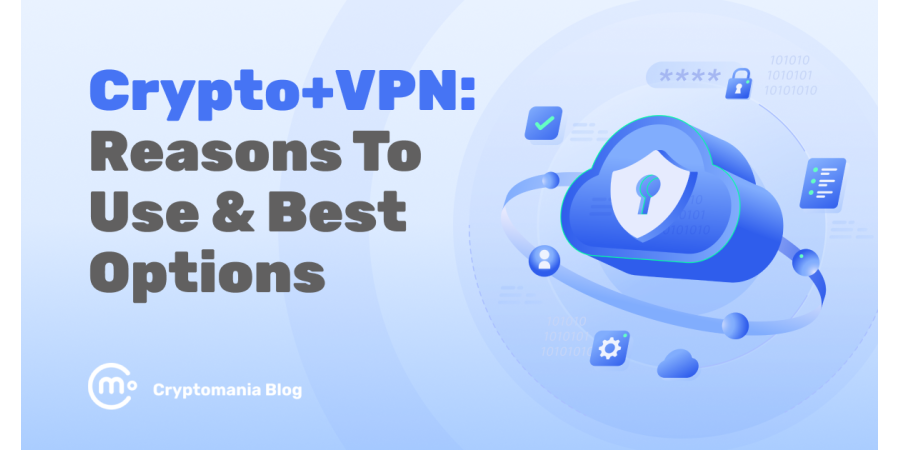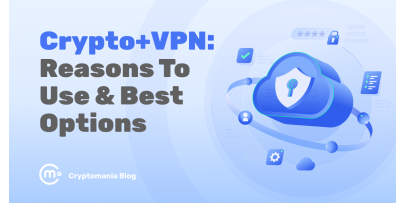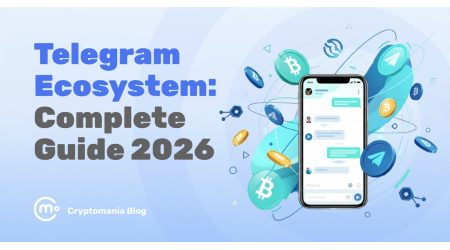

Crypto is global in theory, but your access depends on where your IP happens to live. Some exchanges block features, some dApps won’t even load, and public Wi-Fi turns your trading session into a security risk. Add ISPs quietly logging your activity, and you’ve got more exposure than most traders realize.
A VPN won’t fix every problem in crypto, but it solves enough of them to make your life a bit easier and more private.
Before we get into the reasons to use one, here’s the quick version of how VPNs actually work.
How VPNs work
A VPN is basically a secure tunnel between you and the internet. Instead of sending your traffic out raw — the way most people unknowingly do — a VPN encrypts everything and routes it through a remote server. The result? Websites and apps see the VPN’s IP, not yours.
For crypto traders, this matters a lot more than it does for regular browsing:
- Your real IP often gets tied to exchange logins and wallet interactions.
- dApps can adjust access or block you completely based on location.
- Some platforms fingerprint your network setup to track you across sessions.
A VPN cuts a big chunk of that noise. It makes your traffic unreadable to ISPs, harder to profile for attackers, and less tied to your real-world location. It also means you’re not forced to trade under whatever geo-restrictions your country (or your airport Wi-Fi) decides to slap on you.
VPNs for crypto trading: 10 real benefits
Trading without a VPN isn’t “unsafe,” but it leaves you exposed to stuff you don’t need to be exposed to: restrictions, profiling, noisy Wi-Fi setups, and exchanges quietly deciding what you can or cannot access based on your location. A VPN fixes a good chunk of that with one simple switch, and the benefits go way beyond “more privacy.”
Here are 10 ways VPNs help you trade crypto.
1. Bypass geo-restrictions
Some crypto platforms won’t even let you access the homepage if you’re in a blocked region. Crypto casinos are a perfect example: you get nothing but a “Not available in your region” window before you even see the interface.
A VPN fixes that. Pick a supported location, refresh, and the site loads normally. Easy.
It doesn’t just unlock access, it lets you choose the region that gives you the full version of the platform instead of the “sorry, not available” version your IP gets by default.
2. Get fairer access to liquidity and markets
Some platforms offer deeper liquidity, better fees, or faster execution depending on the country they think you’re from. With a VPN, you’re not stuck with the “local tier” experience, you can access any country’s native exchanges and apps as if you lived there.
Check out my Best Apps for Crypto Trading in India article. A VPN lets you explore how those platforms work for actual local users and compare the trading experience to what you get in your own region. You can compare markets the way locals see them, not the restricted version your IP forces on you.
Sometimes the difference is tiny. Sometimes it’s night and day.
3. Reduce targeted attacks and network profiling
Attackers love IP-based targeting. If they know your region, ISP, and traffic patterns, you’re easier to phish and easier to model.
A VPN breaks that link. Your signals look generic, your IP rotates, and your network fingerprint becomes less “personal.”
4. Avoid ISP snooping and throttling
ISPs quietly log browsing patterns, and crypto trading traffic stands out. Some even throttle high-frequency connections or exchange-related spikes.
Use a VPN to hide that entire category of activity. To your ISP, it’ll be just encrypted noise.
5. Safer access to dApps and wallets
Most people don’t realize that connecting MetaMask, Phantom, or any dApp exposes metadata to whoever runs the backend. Your IP included.
With a VPN, you get a clean, neutral network identity so your wallet activity isn’t tied to your physical location.
DApps, casinos, and on-chain apps all leak similar metadata.
6. More secure trading on public Wi-Fi
Airport Wi-Fi, hotel Wi-Fi, coworking Wi-Fi — if it’s free, assume it’s compromised.
In these conditions, VPN is a must. Especially if you’re checking your crypto account or trading.
7. Extra protection when researching new platforms
No matter what you’re doing: checking a new exchange, testing a dApp, or poking around sketchy sites, your IP is one of the first things these platforms collect.
A VPN means your real IP never shows up in their logs, and it’s perfect when you’re exploring new tools or offshore platforms mentioned in my No KYC: Best Anonymous Crypto Exchanges guide.
8. Stay off the radar in restrictive regions
In some countries, crypto isn’t just “regulated”, it’s watched. Exchanges get blocked, wallet activity gets monitored, and traders end up on the wrong side of automated filters.
A VPN helps you operate without broadcasting your IP to whoever is monitoring local traffic. It’s basic privacy when the rules are unclear, inconsistent, or suddenly change overnight.
9. Extra defense against phishing and fake exchanges
Phishing attacks in crypto aren’t subtle. Fake login pages, sponsored scam links, and cloned dApps are waiting for one wrong click.
Many solid VPNs come with built-in threat blocking. That means malicious domains get filtered before you even see them, and sketchy redirects never load.
10. Keep your IP out of the crypto data trail
Your IP address is the easiest piece of information to link your trades, wallets, and on-chain behavior back to you.
A VPN replaces your real IP with a neutral one, which means your trading habits and wallet activity don’t tie back to where you live, work, or travel.
It won’t make you 100% anonymous, but it removes one of the biggest breadcrumbs in the whole chain.
Best VPNs for crypto trading
Paid options
These are the ones you actually want to trade with. Paid VPNs give you the speed, stability, and privacy guarantees you need for crypto + efficient customer support.
If you want the safest pick with the least hassle, this is it.
- Consistently fast servers
- Great for exchanges and dApps
- Strong no-logs policy
- Kill switch actually works
Good for traders who want performance without micromanaging settings.
The UI is clean, connections are stable, and it works even in regions with heavy restrictions.
- Great for travel
- Minimal speed drop
- Known for strong privacy practices
Perfect if you want a “set it and forget it” VPN that doesn’t slow your trading flow.
Cheaper but surprisingly solid.
- Unlimited devices per account
- Fast WireGuard protocol
- Reliable for mobile trading
Good for beginners or anyone who wants decent privacy without paying top-tier prices.
| VPN | Approx. monthly (1-month) | Approx. monthly (12- or 24-month deal) |
| NordVPN | ~$12.99/month for 1-month plan | From ~$2.99/month for a 2-year plan |
| ExpressVPN | ~$12.99/month for 1-month plan | From ~$3.49/month for a 2-year plan |
| Surfshark | ~ $15.45/month for 1-month plan (flexible plan) | From ~$2.19/month (~$59.13 total) for a 24-month deal |
Free options
These are useful, but there are limitations you should know about.
Free VPNs are fine for basic browsing or occasional wallet checks, not for active trading. Expect slower speeds, fewer locations, and stricter limits.
Actually, the best free option.
- Legit no-logs
- No data caps
- Decent speeds for a free tier
Great for secure browsing or checking dApps, but not ideal for fast-paced trading.
- Free tier includes popular regions
- Good performance if you stay within the data limit
- Has built-in ad and tracker blocking
Reliable, but the data cap makes it unsuitable for long trading sessions.
- Simple interface
- Works for lightweight crypto use
- Noticeable speed dips during peak hours
Okay for occasional access, but expect inconsistencies.
Possible drawbacks of using a VPN for crypto trading
Using a VPN is generally a smart move for privacy and access, but it’s not a magic upgrade.
There are a few things you need to keep in mind so you don’t create new problems while trying to solve old ones.
Here are the main limitations and “gotchas” to be aware of.
1. Some exchanges don’t like location hopping
A sudden login from a different region can trigger “suspicious activity” alerts.
It’s not because you did anything wrong, it’s just exchanges panic when IPs jump countries.
Pro tip: If you use a VPN, stick to one region to avoid unnecessary account checks.
2. It might violate platform terms
Certain platforms explicitly say: “Don’t use VPNs.”
Others pretend they don’t notice… until they do.
This doesn’t always result in bans, but you may face extra verification or a locked session if they detect inconsistent logins.
3. Extra latency if you pick a slow server
A VPN adds a middle step between you and the exchange.
If you connect to an overcrowded or faraway server, chart updates and order execution might feel slower.
Pro tip: choose servers close to the platform’s infrastructure.
4. Free VPNs come with real risks
Slow speeds, data caps, unreliable kill switches, and, in the worst cases: logging your activity.
Free VPNs are fine for research, reading, or checking dApps, but not for actual trading sessions where stability matters and security is paramount.
5. A VPN doesn’t make you anonymous
This is the big misconception.
A VPN hides your IP. It does not hide your identity on a KYC exchange, erase your on-chain history, or protect you from bad trading decisions.
Think of it as a privacy upgrade, not a cloak of invisibility.
6. Using the wrong settings can break your setup
Turn off the kill switch? Switch servers mid-session? Forget to use the same region every time you log in?
These slip-ups create weird login patterns that exchanges notice immediately.
How to use a VPN safely for crypto trading
Using a VPN is simple, but using it correctly keeps you out of trouble. Here’s the short, practical checklist.
Choose a VPN with audited no-logs
If the provider keeps records, the whole point of using a VPN disappears. Look for services with verified no-logs audits, not marketing claims.
Stick to the same server location
Jumping between countries triggers exchange security alerts. Pick one region and trade from it consistently.
Enable the kill switch
If the VPN disconnects, your real IP leaks instantly. A kill switch pauses all traffic until the connection is restored.
Use modern protocols (WireGuard or OpenVPN)
They’re faster, safer, and more stable for live charts and dApps.
Don’t mix KYC accounts with random locations
If you use a KYC exchange, keep your VPN region aligned with your verified country. Wild location switches are a red flag.
Avoid free VPNs for actual trading
Fine for research or checking dApps. Not fine when uptime, speed, and reliability matter.
Combine VPN privacy with basic browser hygiene
Use a clean browser profile for trading, clear cookies, block trackers, and never click sponsored “exchange login” ads — they’re a phishing trap.
Keep seed phrases offline
A VPN protects your connection, not your device. Treat your device as vulnerable and store seeds somewhere safer.
Test your setup before you trade
Connect, check your IP, load the exchange, open a chart. Make sure everything works smoothly before you risk money.
Next read: No KYC: Best Anonymous Crypto Exchanges 2025





